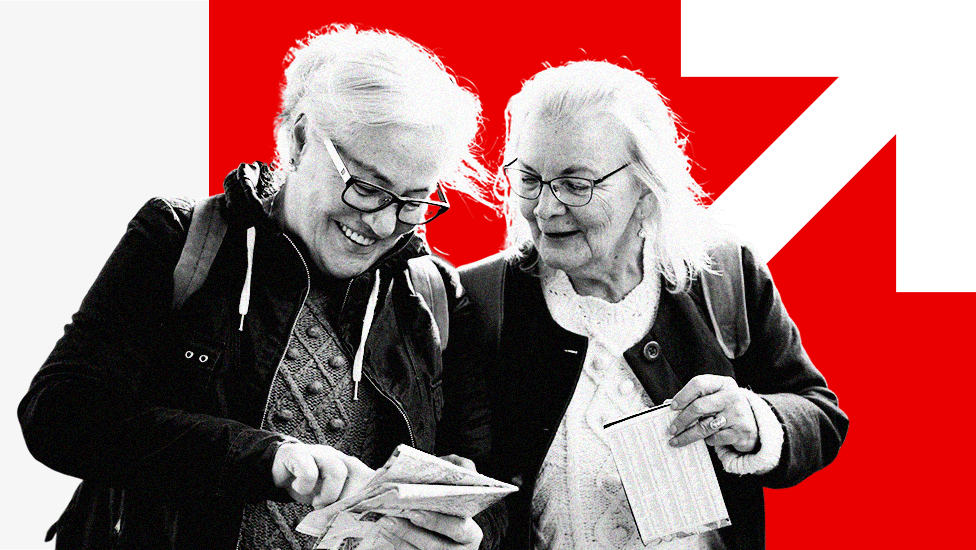State pension and triple lock: How much is it and when can you get it?
- Published
- comments

The state pension has risen by 8.5% because of a measure known as the triple lock.
It means that pensioners receive an amount designed to keep up with rising prices and wages.
What is the state pension and how much is it worth?
The state pension is a payment made every four weeks by the government, to people who have reached the qualifying age and have paid enough National Insurance contributions.
This year, the link to earnings under the triple lock meant an increase of 8.5% from 8 April, making it worth:
- £221.20 a week for the full, new flat-rate state pension (for those who reached state pension age after April 2016)
- £169.50 a week for the full, old basic state pension (for those who reached state pension age before April 2016)
This is a rise from:
- £203.85 a week for the full, new flat-rate state pension
- £156.20 a week for the full, old basic state pension
What is the state pension 'triple lock' and how does it work?
Under the triple lock system, the state pension increases each April in line with whichever of these three measures is highest:
- inflation, as measured by the Consumer Prices Index (CPI) in the September of the previous year
- the average increase in wages across the UK
- or 2.5%
The triple lock was introduced by the Conservative-Liberal Democrat coalition government in 2010.
It was designed to ensure the value of the state pension was not overtaken by the increase in the cost of living or the working population's income.
Will the triple lock continue?
In March, Chancellor Jeremy Hunt said the Conservatives would continue the triple-lock system, if they won the next general election.
Labour also said it was "committed to retaining" the triple lock.
The triple lock was temporarily suspended after the Covid pandemic distorted average wage figures, but later restored.
What is the state pension age and when can I retire?
More than 12 million people currently receive the state pension.
Men and women born between 6 October, 1954 and 5 April, 1960 start receiving their pension at the age of 66.
But for people born after this date, the state pension age is increasing:
- a gradual rise to 67 for those born on or after 5 April, 1960
- a gradual rise to 68 between 2044 and 2046 for those born on or after 5 April, 1977
There was speculation in the run-up to the 2023 Budget that the second increase would be brought forward, potentially to the late 2030s.
However, in March 2023, the government said it had no plans to change the timetable and indicated a decision was expected in 2026, after the next general election.
In February 2024, the International Longevity Centre UK think tank published a report suggesting that the state pension age may need to increase more quickly than the current schedule.
The organisation tracks the impact of growing life expectancy and falling birth rates.
It argues that the UK and other countries with ageing populations will have to increase their state pension age to 71 by 2050, to keep the cost sustainable.
The state pension cost £110.5bn in 2022-2023, just under half the total amount the government spends on benefits.
The Office for Budget Responsibility thinks this will grow to £124bn in 2023-2024.
What other financial help do pensioners get?
Depending on their overall income, those above retirement age may also be entitled to Pension Credit in addition to the basic state pension.
Pension Credit tops up your weekly income to:
- £218.15 if you're single, up from £201.05
- £332.95 if you have a partner, up from £306.85
If your income is already above those limits, you might still be eligible if you have a disability or care for someone.
Anyone who qualifies for Pension Credit may also be entitled to other financial support, including cost-of-living payments, housing benefit, a reduction in council tax, or help with heating costs through the Warm Home Discount Scheme.
People born before 25 September 1957 are also entitled to the annual winter fuel payment.